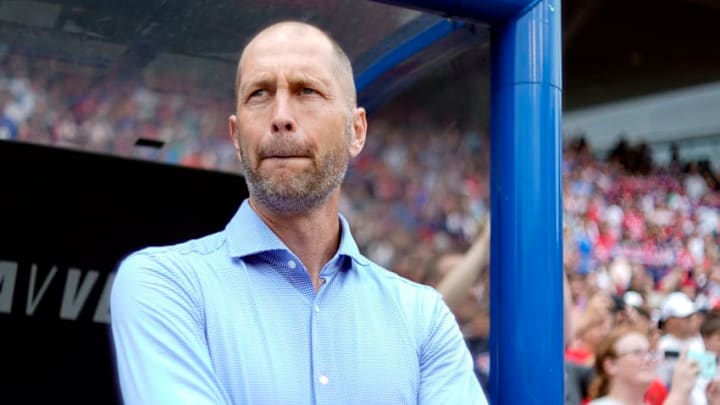Gregg Berhalter announced his USMNT squad for the October CONCACAF Nations League matches this week. There is an over-dependency on MLS. It is where he is going wrong, but also points to the egregious expectations of supporters.
Predictably, the latest U.S. Men’s National Team roster announcement has caused quite the stir. It was always going to. It always does, almost no matter the decisions that are — and, perhaps more crucially, are not — made.
Head coach Gregg Berhalter is nearing the end of his first year in charge. After the first six months of his tenure focused on the summer’s Gold Cup, where his USMNT reached the final but ultimately fell to Mexico, who are the unquestioned class of the CONCACAF region, Berhalter and his staff can now turn their gaze towards the next cycle, which leads up to qualification for the 2022 World Cup in Qatar.
This week, Berhalter unveiled his 26-man roster for two upcoming matches in the CONCACAF Nations League, the first a home match against Cuba in Washington D.C. and the second in Toronto against Canada. It is not the most convincing group of players.
What is most concerning about the squad is the dependency on MLS players. 18 of the 26 players currently play in MLS. That is too many. Moreover, 14 of the 27 players at January camp, Berhalter’s first outing as the USMNT head coach, have also been named in the squad. Berhalter has his favourites, and they are primarily from MLS.
This is not good. While MLS is improving as a league, recruiting higher quality players with every passing year, the overall standard of the league is still a long way off that of the global game, especially the international standard. Where European and South American teams are selecting the best players from the best leagues, the USMNT are settling for middling players in a middling league. This disparity is quite clear.
This has been a Berhalter problem throughout his time as the USMNT head coach. He understands MLS. He knows the players. He picks them because he trusts them. But quite simply and quite harshly, very few are actually good enough to perform on the international stage.
More from MLS Multiplex
- Javier Milei Elected in Argentina: Potential Impacts on MLS and Signings of Argentine Players
- Orlando City and New York City FC in the Battle for Matías Arezo; Grêmio Enters Negotiations! Who Will Come Out on Top?
- USA, Honduras, Panama, and Canada Close in on a Spot in the 2024 Copa America
- De Gea Turns Down Al-Nassr’s Lucrative Offer: Speculation Points to Possible Reunion with Messi at Inter Miami
- Messi’s Magnetic Impact in the United States
And yet, the criticism of Berhalter and his MLS-dependency is a little misguided. What else would have him do? Should Alex Mendez or Richard Ledezma have been included? Maybe, but not certainly. Julian Green has been raised by others, as has Duane Holmes and Ventura Alvarado. But are these players clear-cut better than those that have been included in their stead? No. It is not as if they are ripping apart top-five European leagues. Moreover, Tyler Adams, John Brooks, Alfredo Morales and Tim Weah are all Europe-based and will all miss these fixtures through injury. It is expected that all would be included in Berhalter’s squad if they were available.
This does not excuse Berhalter’s squad. It is still too MLS-heavy. Anyone who says it isn’t is not paying attention to the gaping chasm between MLS and world football. But perhaps it pertains more to the expectations of the U.S. fans than it does Berhalter’s selections. Like it or not, but the U.S. do not have very good players. And that means they do not have very many players playing in Europe at a high level.
Maybe, then, the problem does not lie at the doorstep of Berhalter, although he should not be entirely excused, but at the overall talent of the U.S. system and the expectations of the fans for this limited talent.
Berhalter has made mistakes and is deserving of criticism. His squad selections are overly dependent on MLS and rely too heavily on the favourites that he inherently and somewhat undeservedly trusts. But there is not much else that he can do. This is the state of football in America and it is the expectations that must change.
